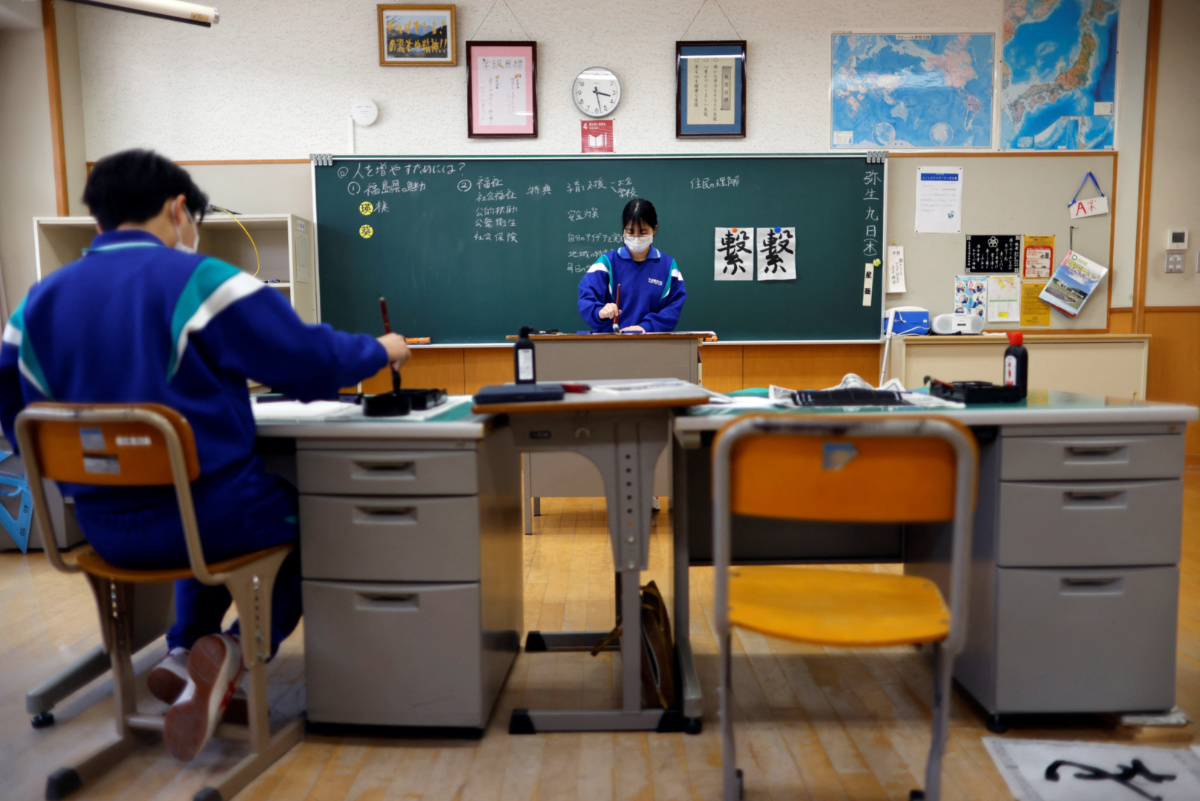
EIMI YAMAMITSU, TOM BATEMAN and ISSEI KATO, of Reuters, report from the village of Ten-ei…
Ten-ei, Japan
Reuters
As Eita Sato and Aoi Hoshi walked towards their junior high school graduation ceremony, their footsteps echoed in polished halls once crowded and noisy with students.
The two were the only graduates of Yumoto Junior High in a mountainous part of northern Japan – and the last. The 76-year-old school shut its doors for good when the school year finished at the end of March.
“We heard rumours about the school closure in our second year, but I didn’t imagine it would actually happen. I was shocked,” Eita, who like Aoi is 15, said.

Eita Sato, 15, and Aoi Hoshi, 15, who are the only two students at Yumoto Junior High School, attend a Japanese traditional calligraphy class to write a message that will be engraved into the school’s closing memorial stone, a few days before their graduation and the institution’s closing ceremony, in Ten-ei Village, Fukushima Prefecture, Japan, on 9th March, 2023. PICTURE: Reuters/Issei Kato
As Japan’s birthrate plunges faster than expected, school closures have picked up pace especially in rural areas like Ten-ei, a mountainous skiing and hotspring area in Fukushima prefecture, dealing a further blow to regions already struggling with depopulation.
“We heard rumours about the school closure in our second year, but I didn’t imagine it would actually happen. I was shocked.”
– Student Eita Sato
Falling births are an Asian regional issue, with the costs of raising children dampening birthrates in neighbouring South Korea and China. But Japan’s situation is especially critical.
Prime Minister Fumio Kishida has pledged “unprecedented measures” to boost the birthrate, including doubling the budget for child-related policies, and says maintaining the educational environment is crucial.
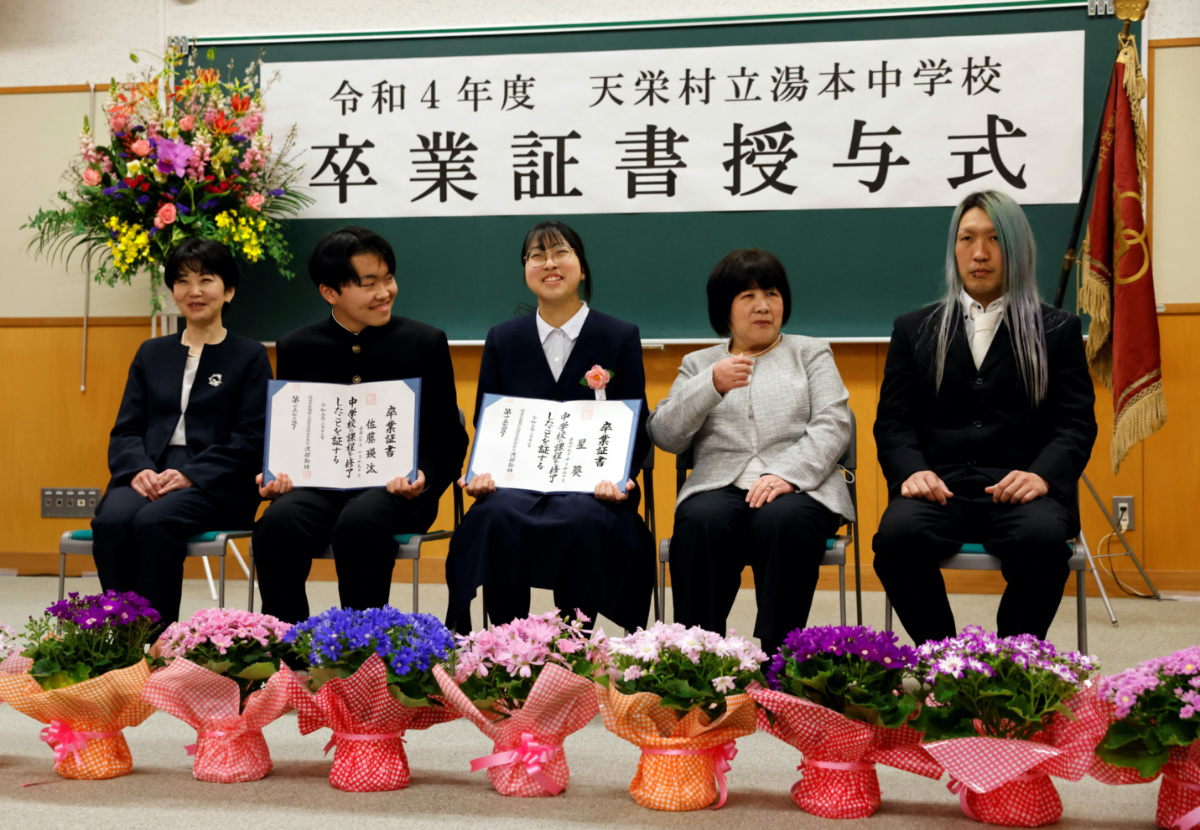
Eita Sato, 15, and Aoi Hoshi, 15, who are the only two students at Yumoto Junior High School, attend a photo session with their Eita’s mother Masumi Sato, 46, and Aoi’s grandmother Hisako, 68, and father Kazuhisa, 37, after the students’ graduation and the institution’s closing ceremony, in Ten-ei Village, Fukushima Prefecture, Japan, on 13th March, 2023. PICTURE: Reuters/Issei Kato
But little has helped so far.
Births tumbled below 800,000 in 2022, a new record low, according to government estimates and eight years earlier than expected, dealing a knockout blow to smaller public schools that are often the heart of rural towns and villages.
About 450 close every year, government data shows. Between 2002 and 2020, nearly 9,000 shut their doors forever, making it hard for remote areas to lure in new and younger residents.
“I’m worried that people won’t consider this area as a place to relocate to start a family if there is no junior high school,” said Eita’s mother Masumi, also a Yumoto graduate.
Ten-ei, a village of just under 5,000 residents with only around 10 per cent under the age of 18, is in a quiet rural area known for its rice and sake. The Yumoto area has hot spring inns on the mountains and is dotted with ski rental shops and campsites. There are also “beware of bears” signs.
The village at its peak in the 1950s had more than 10,000 residents, supported by agriculture and manufacturing. But the area’s growing inconvenience and remoteness prompted residents to leave.
Depopulation picked up speed after the 11th March, 2011, disaster at the Fukushima Dai-ichi nuclear plant less than 100 kilometres away, with Ten-ei suffering some radioactive contamination that has since been cleaned up.
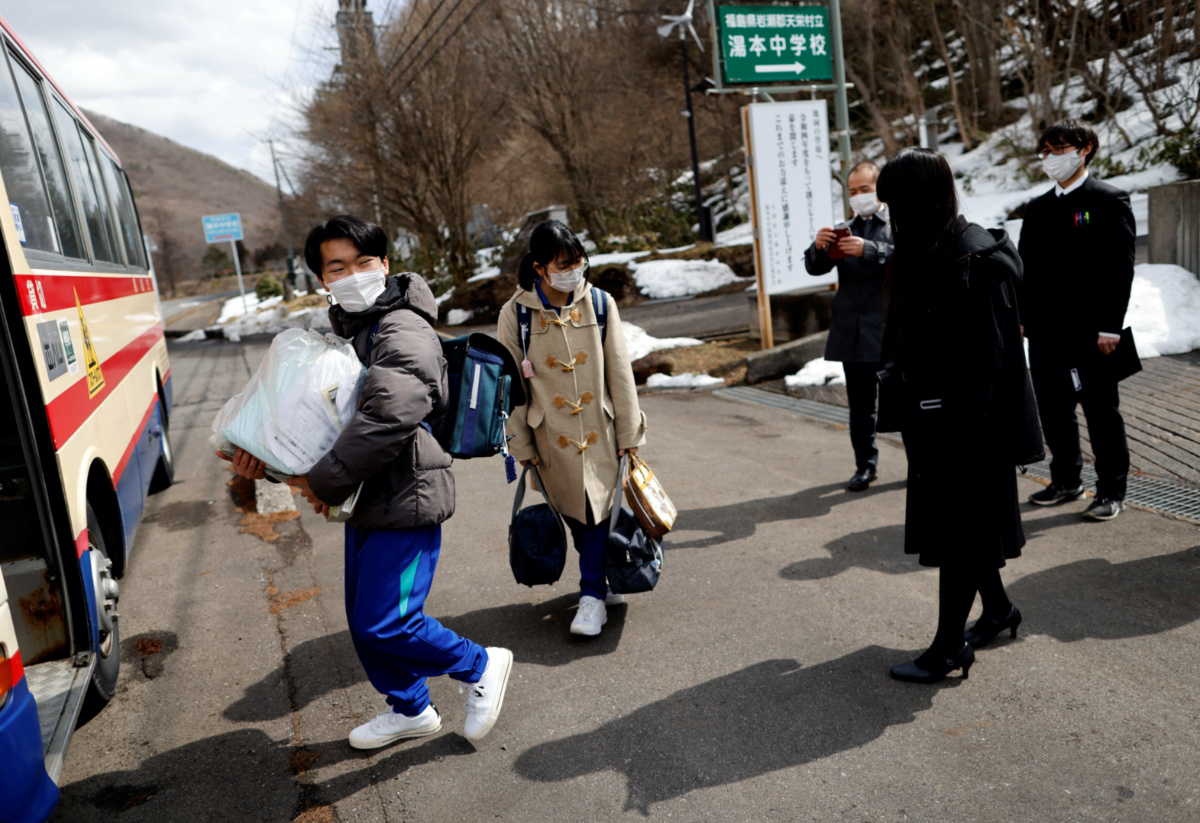
Eita Sato, 15, and Aoi Hoshi, 15, the only two students at Yumoto Junior High School, take the last school bus back home as their teachers see them off on the day before their graduation and the institution’s closing ceremony, in Ten-ei Village, Fukushima Prefecture, Japan, on 10th March, 2023. PICTURE: Reuters/Issei Kato
The Yumoto school, a two-storey building located in the centre of the district, had some 50 graduates a year during its heydey in the 1960s.
Photos of each graduating class hang near the entrance, going from black and white to colour – with the number of students visibly and suddenly dropping from around 2000.
There is no picture from the last year.
We rely on our readers to fund Sight's work - become a financial supporter today!
For more information, head to our Subscriber's page.
Eita and Aoi, together since three, were in a five-person class through elementary school but were the only two to go on at Yumoto.
Their desks sat side-by-side in the centre of a classroom designed for 20, and during their first year they “fought a lot”, Eita said.
But tensions eased and they adapted, trying to simulate a normal school experience. For the afterschool club activity that is a key part of Japanese schooling they selected pair sports, mainly table tennis.
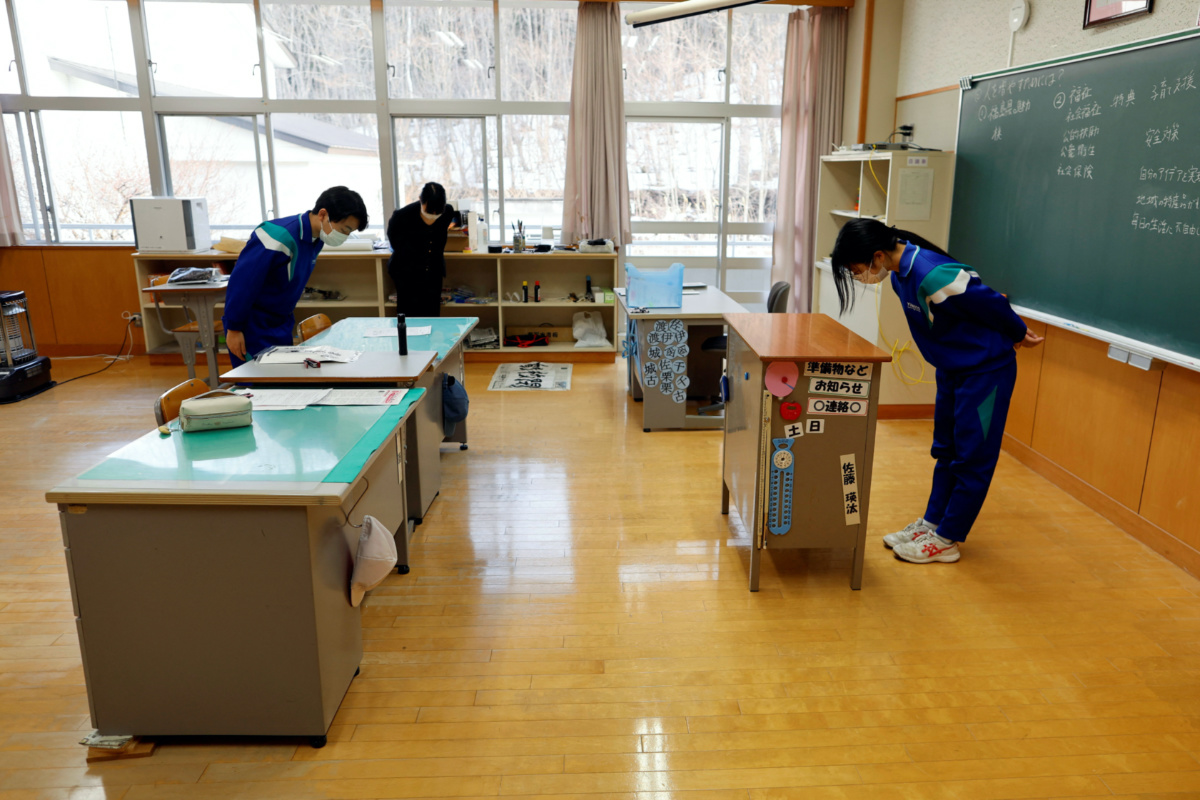
Teacher Yumemi Kanazawa, 30, Eita Sato, 15, and Aoi Hoshi, 15, the only two students at Yumoto Junior High School, attend a class a few days before their graduation and the institution’s closing ceremony, in Ten-ei Village, Fukushima Prefecture, Japan, on 9th March, 2023. PICTURE: Reuters/Issei Kato
On graduation day, teachers pinned corsages on the laughing graduates, usually a job for younger students.
“People are very disappointed there’s no longer a source of culture,” said principal Mikio Watanabe of the decision to close, taken in consultation with village residents. “The place will be quieter without children’s voices.”
Experts warn that rural school closings will widen national disparities and put remote areas under more pressure.
“The school closure means the municipality will eventually become unsustainable,” said Touko Shirakawa, a sociology lecturer at Sagami Women’s University.
Ten-ei will discuss repurposing the school building. In other parts of Japan, closed schools have become wineries or art museums.
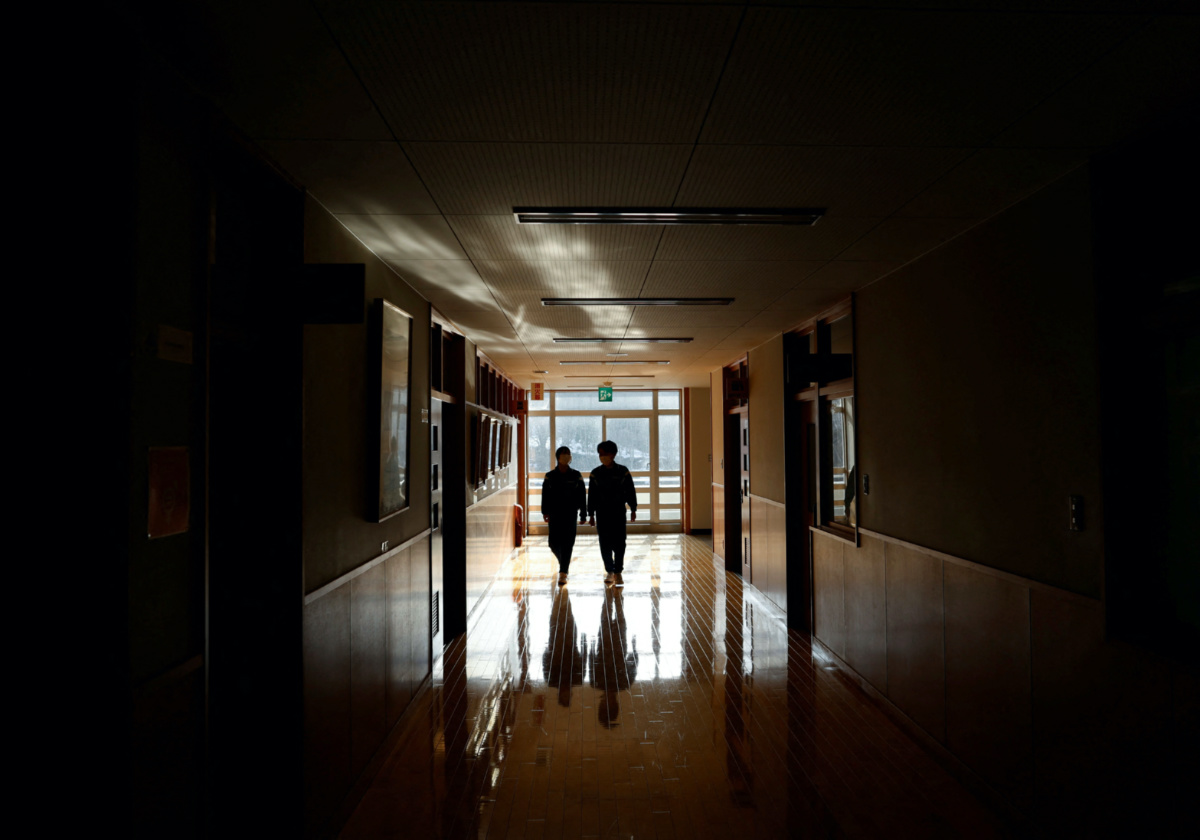
Eita Sato, 15, and Aoi Hoshi, 15, walk along the corridors of Yumoto Junior High School, where they are the only two students, a few days before their graduation and the institution’s closing ceremony, in Ten-ei Village, Fukushima Prefecture, Japan, on 9th March, 2023. PICTURE: Reuters/Issei Kato
Aoi, who dreams of being a nursery school teacher in her hometown, will attend a different school from Eita starting in April.
“I don’t know if there will be any children in the village when I am a teacher,” Aoi said. “But if there are, I want to come back.”






